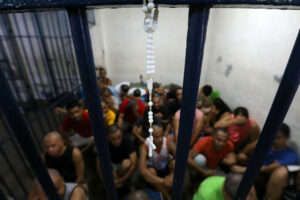
Prisoner transfer program with foreign states sought
THE PHILIPPINE government should establish a prisoner transfer program with other countries in a bid to bring Filipinos incarcerated abroad back, allowing them to serve their prison sentence in their home country, a lawmaker said on Sunday.
Party-list Rep. Marcelino C. Libanan urged the Foreign Affairs, Justice, and Migrant Workers departments to craft the program, which could be based on the United States’ International Prisoner Transfer Program.
“We need a program that will facilitate the transfer of Filipinos convicted of crimes and incarcerated in other countries, so that they can serve the remainder of their sentences here at home, closer to their families,” Mr. Libanan, a House of Representatives minority floor leader, said in a statement.
“In the United States, their international prisoner transfer program is administered by their Department of Justice’s International Prisoner Transfer Unit, while their Department of State, which is equivalent to our DFA (Department of Foreign Affairs), is the chief negotiator of all prisoner transfer treaties,” he added.
Mr. Libanan’s call for the creation of a similar prisoner transfer program comes after Jakarta repatriated Mary Jane F. Veloso after almost 15 years of imprisonment due to drug trafficking charges.
It was only in November last year that Indonesia agreed to repatriate Ms. Veloso, who was arrested in Yogyakarta in 2010 after being found with 2.6 kilograms (5.73 lbs) of heroin concealed in a suitcase.
Returning Filipino prisoners back to the Philippines would help their rehabilitation, he said. “There’s no question that bringing them closer to their loved ones will be more conducive to their rehabilitation.”
There are about 1,200 Filipinos convicted of crimes abroad and is incarcerated across the Asia-Pacific, Europe and Middle East, according to Mr. Libanan, citing data from the Migrant Workers department.
Senate President Francis G. Escudero in November asked the Department of Migrant Workers to pursue treaties to allow convicted Filipinos overseas to serve their prison terms in the Philippines.
He cited the Philippines’ Treaty of Sentenced Persons Agreement with Spain, signed and ratified in 2007. The treaty allowed individuals jailed in another country to serve their sentences in their native country.
The Philippines has similar treaties with the United Kingdom, Thailand, and Hong Kong among others. — Kenneth Christiane L. Basilio
